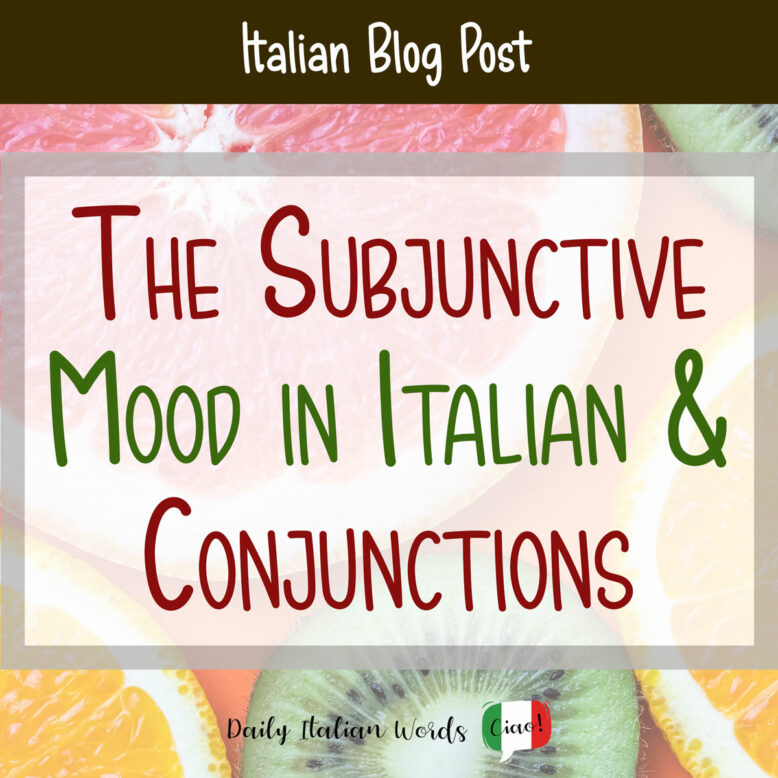Welcome to our third encounter with the subjunctive: if you have read our previous articles, you should have a clear idea of how to use this important verb mood; if you have not read them yet, you can find them here and here. Today we will conclude our journey by talking about the subjunctive ‘in real life’, and in particular about its use with conjunctions, but before we go any further, here is a brief summary of the key points about this distinctive feature of the Italian language:
- The subjunctive mood is used to express possibility, wish, fear, doubt and personal opinion. The indicative mood, in contrast, presents facts as true, real, certain. Credo che tu sia felice: subjunctive; So che tu sei felice: indicative.
- It is often used in dependent clauses introduced by che: Io spero che tu vada presto a Roma. Watch out! If the subject of the two clauses is the same, use di + infinitive: Io penso di andare presto a Roma.
- It is also used in independent clauses to express a doubt, a wish, an exhortation, an exclamation. Viva l’Italia! Sapessi come sono felice!
- It has four tenses: presente, imperfetto, passato, trapassato.

Il congiuntivo ama le congiunzioni (The subjunctive loves conjunctions)
We know that the words congiuntivo and congiunzione both come from the Latin coniungĕre, which means to join, to unite; our focus today is on conjunctions that require the subjunctive mood. Here is a list of the most common ones:
As always, there are exceptions: a few conjunctions can be followed by the indicative or the subjunctive, depending on whether we are expressing a certain fact or a possibility. Let us put all this into practice to make everything clearer: you are having dinner at a friend’s house in your favourite Italian city; you have brought a gift for the hostess, and just as you are about to give it to her…
David: Carol, dov’è il regalo per Elena? Spero che tu non lo abbia dimenticato a casa. Ah, eccolo. Ma Carol, non hai tolto l’etichetta del prezzo!
Carol: Pensavo che l’avessi tolta tu! Presto, toglila, prima che Elena la veda!
David: Un attimo, devo farlo con calma, senza che si rompa. Fatto!
Carol: Appena in tempo! Eccola…
David: Carol, where is Elena’s present? I hope you didn’t forget it at home. Ah, here it is. But Carol, you didn’t take the price tag off!
Carol: I thought you took it off! Quick, take it off before Elena sees it!
David: Wait a second, I have to do this slowly, without breaking it. Done!
Carol: Just in time, here she is…
Senza che, prima che
In this dialogue, the subjunctive is in the sentences spero che tu non lo abbia dimenticato and pensavo che l’avessi tolta, introduced by the verbs sperare and pensare. David hopes and Carol thought, we are far from the world of certainty and the subjunctive here is mandatory. In the following sentences, the subjunctive is introduced by the conjunctions prima che, literally “before that”, and senza che, literally “without that”: before Elena sees it and without breaking it. Prima che looks to the future, we are talking about an action that is not real yet, and the same goes for senza che: we are still in the realm of possibility. As you can see, the subjunctive is alive and well in our thoughts and in everyday speech.
Let us now look at other common conjunctions.
Affinché, perché
Affinché, perché, in modo che, cosicché (so that, in order to): all these conjunctions express the purpose of an action, and they are followed by the subjunctive.
- Spiegherò la regola cosicché possiate capire. = I will explain the rule so that you can understand.
- Spiego la grammatica in inglese in modo che la capiate tutti. = I explain grammar in English so that you all understand it.
But what about perché? Doesn’t it mean why/because? Not always. Perché can also be a synonym of affinché:
- Ho comprato due biglietti per il cinema perché venga anche tu.
I bought two cinema tickets so that you can come, too; maybe you will come, maybe you will not, this is a possibility.
- Ho comprato due biglietti per il cinema perché vieni anche tu.
The meaning here is different: I bought two cinema tickets because you are coming too. You are coming: this is a fact, vieni, indicative.
No worries! You do not have to think about whether a fact is certain or not every time you choose a conjunction; there are only few exceptions and the context always clarifies the meaning of perché:
- Cucino perché amo mangiare. = I cook because because I love eating.
- Vado a casa a cucinare perché Elena trovi la cena pronta. = I’m going home to cook so that Elena finds dinner ready.

Benché, nonostante, malgrado
Benché, nonostante, malgrado: although, despite. Some examples:
- Nonostante abbia studiato, non ho capito la regola. = Although I studied, I did not understand the rule.
- Per quanto studi, non passo gli esami. = No matter how much I study, I don’t pass my exams.
- Benché io ami il mare, vado sempre in montagna. = Although I love the sea, I always go to the mountains.
- Vado a ballare malgrado sia stanca = I’m going dancing even though I am tired.
Watch out: the conjunction anche se, even if, is followed by the indicative:
- Vado a ballare anche se sono stanca. = I’m going dancing even though I am tired.
Come se, quasi
Come se means as if, while quasi means almost/almost like.
- Sono felice come se fossi in vacanza. = I am as happy as if I were on holiday.
- Questa plastica è molto trasparente, quasi fosse vetro. = This plastic is very transparent, almost like glass.
Quasi and come se require the imperfect subjunctive, a tense that is often used for imagined situations: I am not on holiday and this plastic is not glass. Here Italian is similar to English, where a past tense is also used for imagined situations: If I won the lottery, I would buy a Ferrari. = Se vincessi la lotteria, comprerei una Ferrari.
A condizione che, a patto che
A large group of conjunctions are used in conditional sentences, such as a condizione che, a patto che, purché, nel caso che, se, qualora, nell’eventualità che, casomai, ammesso che…
A few examples:
- Nell’eventualità che i biglietti siano finiti, guarderò il concerto alla TV. = In the event that tickets are sold out, I will watch the concert on TV.
- Ti ascolto, a patto che tu mi dica la verità. = I will listen, as long as you tell me the truth.
- Se fosse vero, te lo direi. = If it were true, I would tell you.
Let us wrap up our overview of Italian conjunctions that require the subjunctive with an excerpt from a song by Lucio Dalla, one of the most popular Italian singer-songwriters of all time:
Così lei restò sola nella stanza, la stanza sul porto, con l’unico vestito ogni giorno più corto, e benché non sapesse il nome e neppure il paese, m’aspettò come un dono d’amore, fin dal primo mese.
Can you spot the subjunctive? I bet you can!
Our videos on the subjunctive mood:
About the Author: My Italian Circle is a place where you can go to find engaging new ways to learn Italian, test and improve your listening skills, and maybe even make peace with Italian grammar. We create clear, accurate, authentic content every week on YouTube and Patreon.

Anna is a professional language teacher and Diana is a freelance translator. On their website and YouTube channel My Italian Circle, they create content for Italian learners, especially English speakers. They help with grammar, progression from beginner level, and offer insights into authentic everyday Italian, Italian culture, and lifestyle.


